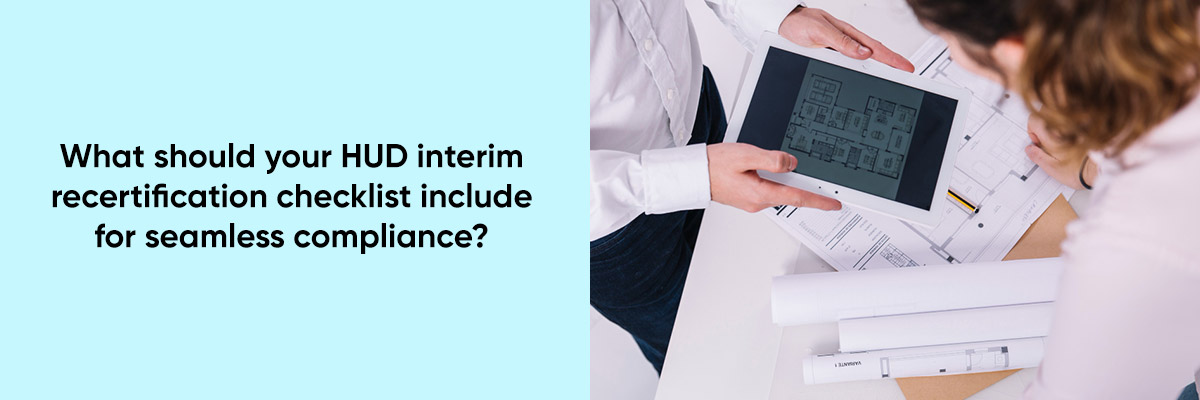The U.S. Department of Housing and Urban Development (HUD) performs a crucial role in ensuring affordable housing for low-income individuals and families. As a property manager or landlord participating in HUD programs, it’s essential to stay on top of compliance requirements, especially regarding HUD interim recertification for HOTMA.
Interim recertifications are periodic reviews conducted between annual recertifications to assess changes in a tenant’s income or family composition. To ensure seamless compliance with HUD guidelines, having a comprehensive interim recertification checklist is essential.



Interim recertification checklist:
- Updated Documentation: Begin the checklist by ensuring that all required documentation is up-to-date. This includes income verification documents, such as pay stubs, tax returns, or statements from government assistance programs. Additionally, gather documentation related to changes in family composition, employment status, or other relevant factors.
- Schedule Compliance Training: Stay informed about the latest HUD regulations and compliance requirements by scheduling regular training sessions for your staff. This ensures that everyone involved in the recertification process is well-versed in the current guidelines, reducing the risk of errors and non-compliance.
- Tenant Communication: Establish clear lines of communication with tenants to inform them about the upcoming interim recertification process. Provide them with a checklist of required documents and a timeline to ensure they have ample time to gather the necessary information. Encourage open communication to address any concerns or questions they may have.
- Use HUD-Approved Forms: HUD provides specific forms for interim recertifications. Ensure that you are using the most up-to-date and approved forms to collect and document tenant information. Using the correct forms helps streamline the process and ensures compliance with HUD standards.
- Maintain Detailed Records: Keep detailed records of the interim recertification process. Document all communication with tenants, note any changes in income or family composition, and maintain a comprehensive file for each tenant. Accurate and organized records are crucial for both compliance and audit purposes.
- Compliance Software: Consider investing in compliance software that can streamline the interim recertification process. These tools often automate calculations, track key dates, and provide alerts for upcoming recertifications. Utilizing technology can enhance efficiency and reduce the risk of manual errors.
- Train Staff on Cultural Competency: In diverse communities, it’s important to train staff on cultural competency to handle sensitive issues with respect and understanding. This ensures that the interim recertification process is conducted in a fair and unbiased manner, promoting positive tenant relations.
- Conduct Internal Audits: Regularly conduct internal audits to review your interim recertification processes. This proactive approach allows you to identify and address potential compliance issues before they become major problems. It also demonstrates your commitment to maintaining high standards of compliance.
Bottom Line:
Navigating HUD interim recertifications requires careful attention to detail and a commitment to staying informed about the latest regulations. By implementing a comprehensive checklist, maintaining open communication with tenants, and investing in training and technology, property managers can ensure seamless compliance with HUD guidelines. This proactive approach not only safeguards the interests of property owners but also contributes to the overall success of affordable housing programs.


